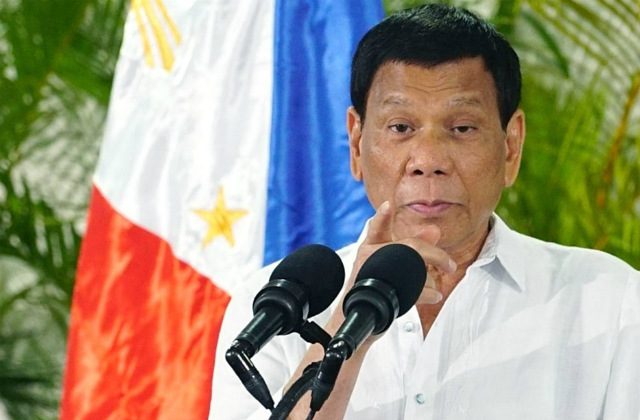SUMMARY
This is AI generated summarization, which may have errors. For context, always refer to the full article.

MANILA, Philippines (4th UPDATE) – President Rodrigo Duterte on Thursday, March 14, released another edition of his administration’s narco list, containing names of politicians allegedly involved in illegal drugs.
The government issued the list through state-run television stations PTV4 and RTVM ahead of the midterm elections in May. It also sent the full list to reporters after the broadcast.
The President bared the list in his home city of Davao during the National Peace and Order Council meeting attended by top police and military officials.
“An official’s right to privacy is not absolute and there is a compelling reason to prioritize the state and the people. As your president, my ultimate concern is the pursuit of order in government,” Duterte said before beginning reading out the list.
He read each and every name into the microphone, at times making commentary after mentioning a name, like, “Ikaw, taon-taon nasa listahan ka (You, you’re on the list every year),” “Galing lang ako diyan, salamat sa pagbati mo sa akin (I just visited your place, thanks for welcoming me),” “Hindi pa kayo namamatay lahat? (You haven’t died yet?)” and “Narinig na kita noon pa (I’ve long heard about you).”
Duterte read and released the names of one former and 45 incumbent officials, comprising of 33 mayors, 8 vice mayors, 3 congressmen, one board member, and one former mayor.
The names belong to a longer list of alleged narco-politicians, which, according to the latest count of the Philippine Drug Enforcement Agency (PDEA), is 82 items long.
With the release of the list, the Duterte government hopes to “inform” voters about certain candidates in the coming elections to supposedly protect the elections from being compromised by narco-politicians and drug money.
Why just partial? Duterte gave out only 46 names because the rest on the government list needed further verification.
“I’m not really interested in releasing it before or after the elections because I don’t have the slightest intentions of hurting anybody or to be a cause of the failure of an election of a certain man who wants to serve the public,” Duterte said.
He said, however, that there is enough evidence finding “probable cause” against those he had mentioned.
“Our job is to reach that standard of probable cause. For the judges, it is proof beyond reasonable doubt [that they are looking for]. For the police and the Armed Forces, you only have to come up with probable cause. Is he probably the criminal of this act? Then, if he is, I must arrest him,” Duterte said in a mix of English and Filipino.
This is the 3rd drug list to be released by the Duterte administration. The first included judges, mayors, and police officials published in August 2016, while the second was a list of barangay officials issued just weeks before the barangay elections in May 2018.
How verified is it? Government officials have said the names on the latest list had been verified, but they have also admitted that they don’t have enough evidence to file charges against these people in court.
This much is evident in the announcement of the list, as the 46 were only slapped with the administrative complaint of “grave misconduct” before the Office of the Ombudsman, not a criminal drug complaint that would formalize the accusation of them being “narco-politicians.”
The PDEA has repeatedly argued that the list is thoroughly checked since 4 government agencies have been tasked to verify it: the Philippine National Police, the Intelligence Service of the Armed Forces of the Philippines, the National Intelligence Coordinating Agency, and the PDEA itself.
PDEA chief Director General Aaron Aquino earlier admitted, however, that despite their verification, the list is “not airtight” and that mistakes are still possible. The 2016 list, for example, included a long-dead judge. The Supreme Court had also cleared 3 judges on the list.
The inclusion of names in the drug list is said to be based on intelligence information gathered by the 4 agencies and the President himself. This intelligence information also includes information informally relayed by anonymous tipsters, making it difficult to refute and verify independently.
Is it right to release it? Rappler has a copy of the list released by the President, but we are not publishing it. Various groups also don’t think it is right to release it.
The Commission on Human Rights earlier warned that the list would only fuel mudslinging and election violence.
Media organizations earlier urged colleagues to refrain from publishing the list.
“Such naming and shaming calls attention to the possible invasion of privacy, as well as denial of due process and presumption of innocence, for those on the list,” said the National Union of Journalists of the Philippines, Philippine Center for Investigative Journalism, Philippine Press Institute, Center for Media Freedom and Responsibility, Mindanews, Center for Community Journalism and Development, Freedom for Media, and Freedom for All Network in a statement on March 7.
Opposition election candidates have also raised the alarm on the release of a drug list. Human rights lawyer and senatorial bet Chel Diokno had called on Duterte to stop weaponizing such lists.
Should the drug list end up naming the wrong people, Malacañang just advised those whose names have been damaged to file a libel case against the government. – Rappler.com
Add a comment
How does this make you feel?
There are no comments yet. Add your comment to start the conversation.